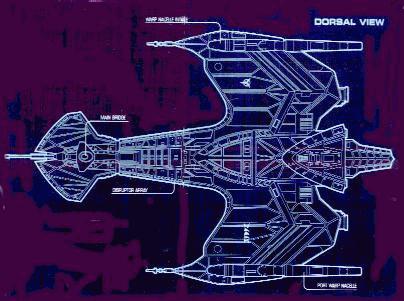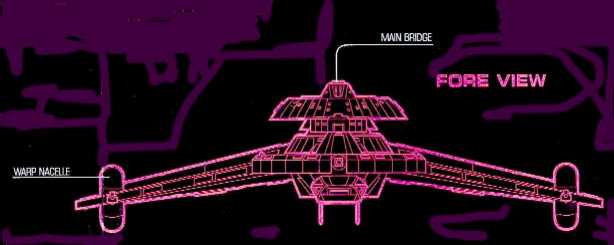|
IKV Hegh qaD Negh'Var Armoured Command Vessel |
||
| BRIDGE | ||
| MEDICAL | ||
| WEAPONS | ||
| DEFENCES | ||
| CLOAKING DEVICES | ||
| HANGARS | ||
| SECURITY | ||
| CREW | ||
|
| ||
|
The IKV Hegh qaD is
the special operations command centre flagship. Primarily designed as a
war ship, the ship has occasionally played host to diplomats, ambassadors
and other such dignitaries but this is rare. The IKV Hegh qaD commands a
huge fleet, which was created to target any incursions into Klingon
Territory together with any allies, against a common enemy. The Ship is
over 685 metres long and has a displacement of over 9.5 million metric
tonnes.
| ||
|
| ||
|
THE BRIDGE is the nerve centre of any vessel and this ship is no exception. A raised swivel command chair in the centre, allows the commander of the vessel to oversee ships operations. The bridge holds terminals for all major departments to allow easy access. A Holographic Communications Unit (HCU) is to be found as the standard view screen. The bridge leads to many important areas, including the Wardroom, the General's ready room, two turbo lifts, the Primary Arsenal and a toilet with a fluffy pink loo roll cover for the XO but further information on him is classified.
| ||
|
| ||
|
The IKV Hegh qaD holds nine hanger decks. Once three of them doubled up as medical triage but now only one is dedicated to medical use. These facilities are on permanent standby. Once aboard, there are two decks for wards. MediDeck 1 holds 200 biobeds and MediDeck 2 holds 50. The rest of this deck has been taken up by the Exobiology Unit and the Alternative Atmosphere Division which allows non-oxygen breathers time on board. Quarters are available for such visitors on the same deck. There is one Operating Room per deck, each holding 10 surgical beds. This allows for multi-role tasking for treatment and co-ordination. Opposite each OR is a Medical Facility Laboratory, where research can be carried out, along with the many other tasks you would expect to find performed on any land or deep space station. Each bed can be isolated by a stasis field. This is a low energy field, through which medical staff can pass, be clinical sterile, and attend to the patient. Along the starboard wall is a monitoring room. This is glass fronted. In this room is the duty MO's office and the room for patient discussions as shifts are changed. Also in this area, are 12 work-stations for patient monitoring. All doorways to and from the wards have also been fitted with the anti-contamination stasis force fields.
| ||
|
| ||
| ||
|
| ||
|
The IKV Hegh qaD was recently re-fitted by the Imperial Military Resources Division and Engineering Corps and this is reflected in the ship's defensive/offensive capabilities. It carries 1500 Photon Torpedoes and 700 Quantum Torpedoes. The ship is also able to lay minefields to cover an area up to 7 light years across, using self-replicating and standard mines. It carries three-times the standard number of disruptor banks, plus nine multi-directional disruptor cannons, which can be computer or manually controlled. There are also 3 twin-mounted blaster cannons and one cannon able to destoy a planet. (Further data on this is classified). The ship has also been fitted with an upgraded tractor beam system, capable of holding a single Borg Cube. The Engineering Corps have fitted advanced shield technology, which is superior to the UFP Sovereign Class Vessels. Due to the operational frequency harmonic fields, the Sovereign Class has "windows" or gaps in the shielding. This is brought about by continual recalibration of the shielding, which permits scans and sensor sweeps. The IKV Hegh qaD shield resonance & recalibration fields operate on a unique frequency and are thus able to withstand a far greater onslaught than the standard Galaxy or Sovereign Class vessels. The Federation shield windows are only partly controllable. The IKV Hegh qaD's are under full control allowing two-way transportation with raised shields. ABLATIVE ARMOUR During tests it was
shown that the upgraded Ablative Armour was able to withstand a constant
attack from the equivalent of 5 Vorcha Class vessels for 2 hours 37
minutes at a range of 750 kellicams. This is, it must be pointed out,
WITHOUT the shields and is simply the armour alone. | ||
|
| ||
|
Considering the
variety of mission roles the IKV Hegh qaD can undertake, covert entrance
and exit from a given location could be vital. Therefore, it was
considered prudent that the cloaking devices, 3 in this case, be modified
and extensive tests and trials have been carried out. The ship can travel
at maximum warp without leaving any ionic particle trail. A single
cloaking device can leave an ionic trail, but the utilisation of three,
creates a warp polarian bubble around the ship. This "envelope" collects
spent plasma vented from the warp nacelles, returns it to the fusion
reactor and re-utilises it in the quantum charge reversal chamber via
power transfer conduits. Further details are
Classified. | ||
|
| ||
|
HANGAR DECK 1 FIRESTORM Squadron are based here. They are an elite Bird of Prey Unit, used as assault/ attack craft; a total of 14 in all. This deck acts as a self-contained unit with an independent technical/weapons tactical support division. The Commanding Officer is Commander qu'bang sutai LoDnI' who has the undying loyalty of her troops ('cos she's cute!). HANGAR DECK 2 WHITEFIRE tactical combat group. A similar unit to FIRESTORM, but flying the Kahless Class Star Sharks, experimental MX-981's. These are very small one-man fighters, which make effective weapons as they are hard for targetting scanners to lock on to. HANGAR DECK 3 This is used for runabouts, probes and repair drones for deep space repairs to the ship. HANGAR DECKS 4-9 Three of these are
utility areas (storage etc.,) and the remaining decks are currently empty.
All the Hangars have three heavy duty cargo/personnel tranporters each
able to beam in/out 200 personnel or 250 metric tonnes of equipment per
transport cycle. | ||
|
| ||
|
The Security Deck can hold up to 250 POW's should the need arise. Generally, Klingons do not take prisoners, so they are little used but the IKV Hegh qaD has had the need to detain prisoners for "Imperial Service". Should an individual or group prove useful to the Empire's rquirements, then they can be detained safely, until the arrival at a suitable transfer facility. Information obtained from "discussions" with prisoners can be relayed ahead on secure sub-space transmission frequencies. One feature added to
the brig during the refit, is the ability to hold shape-shifters. These
cells have been designated Founder Assigned Detention Cells. (FADC's).
Species 8472 can also be detained if necessary. The FADC's have a
receptacle fastened to the wall for reversion to their gelatinous states;
otherwise the room is empty. This receptacle can be removed if needed. The
FADC's have internal and external sensors for each cell. the sensors
generate high energy Quantum Stasis Fields (QSF). Each QSF has its primary
design roots in the field of Holodeck technology and works on the same
basis, but in reverse. Instead of creating an environment to work in, it
creates a negative environment. Having, what is basically a "visual
vacuum" makes changes in even air pressure detectable to within 1000 nano-
cochranes in an Annular Confinement Beam (ACB). This is the same ACB that
is utilised in transporter systems. As these beams sweep a preset area
once every 25 hundredths of a second, it would be impossible to escape.
Visual security monitoring of the Founder Cells is also applied to ensure
that the shape-shifters have not become part of the Cell structure prior
to staff entering the cell. | ||
|
| ||
|
REDISTRIBUTION OF
THIS MATERIAL IS PUNISHABLE BY A MINIMUM PENALTY OF
DEATH | ||
|
| ||


